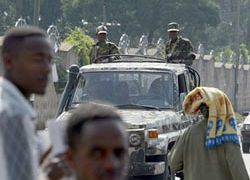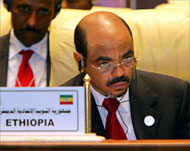Ethiopia region votes after delay
Thousands of people have voted in Ethiopia’s eastern Somali region as elite forces, pro-government militia and police patrolled streets to secure the region’s delayed elections, which have been denounced by a separatist group.

Voters in the mostly ethnic Somali region, some of them armed with assault rifles, gathered at sunrise on Sunday at polling stations to elect 23 federal lawmakers and 168 regional legislators. Some voters said they hoped the election would bring a way out of poverty for the region.
General elections were held in the rest of the country on 15 May. But voting in the Somali region was made difficult by heavy rains, poor communications, the region’s nomadic lifestyle and the presence of separatist rebels.
The May elections were followed by days of violence as protesters angered by allegations of fraud faced off with security forces in deadly clashes.
The Ogaden National Liberation Front, which wants an independent state for ethnic Somalis, denounced Sunday’s elections as a ploy to maintain federal control of the of the impoverished region.
Opposition criticism
The group said in a statement that polls were being held “in an environment where freedom of assembly is habitually denied, freedom of expression punishable by detention and homegrown independent Somali media denied operating rights effectively silencing dissenting political opinion”.
|
“Ballots are being held in military compounds… creating ample opportunity for coercion and intimidation” Opposition statement |
“Ballots are being held in military compounds, and in some cases these same compounds have been designated as venues for casting voting ballots, creating ample opportunity for coercion and intimidation,” the statement said.
“Voting ballots are readily available on the black market and there is no indication that a vast majority of polling stations will have any kind of independent monitors present.”
The elections have revealed a split within opposition parties after candidates ignored calls for a boycott by party leaders who alleged vote tampering in Sunday’s vote. Party leaders accused the military of interference and said their supporters had been harassed.
Voter turnout
Still, farmer Ahmed Mohamoud Bedi, 30, was eager to vote at the Dud Afi village, 760km east of Ethiopia’s capital, Addis Ababa.
“We hope our vote can bring greater development and prosperity to the region,” said the father of 10 who has no electricity or running water at his thatched hut. “We have lived with poverty for too long and now is the time for change.”
Polls opened at 6am and will close at 6pm. Results are expected 5 September.
On Sunday, electoral authorities were also holding a repeat of elections in 20 parliamentary constituencies where the ruling party complained of irregularities in the May vote and in 11 districts where the opposition filed challenges.
Elections saga
 |
|
Premier Meles Zenawi’s party said |
Prime Minister Meles Zenawi’s Ethiopian People’s Revolutionary Democratic Front and the opposition have said that massive irregularities took place across the country.
Protesters angered by alleged fraud in the May vote took to the streets, and human rights groups say 42 people were killed by security forces trying to disperse the crowds.
Results from the May voting show the ruling coalition won 296 seats in the 547-member assembly and its allied parties
won 22 seats. The election board said the opposition won 161 seats. Opposition parties only won 12 seats during the
last elections, in 2000.
Some of the repeat votes being held are in the constituencies of senior government officials, including Information Minister Bereket Simon. He was narrowly defeated, according to provisional results, but lodged complaints of voter intimidation.